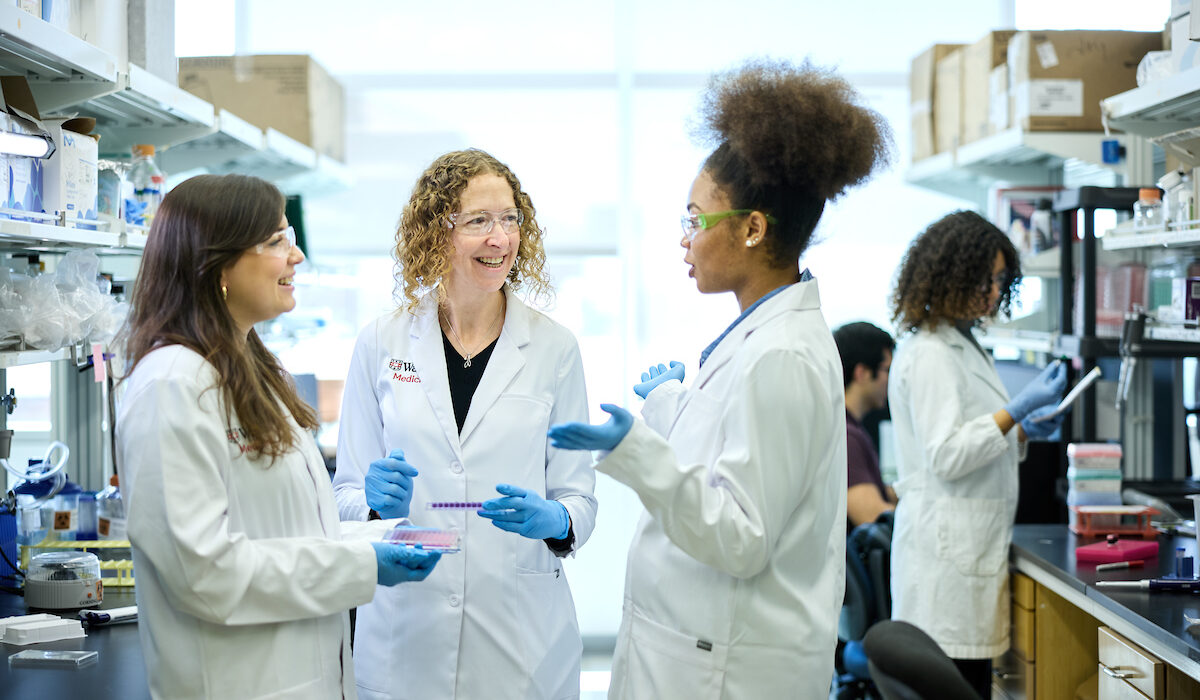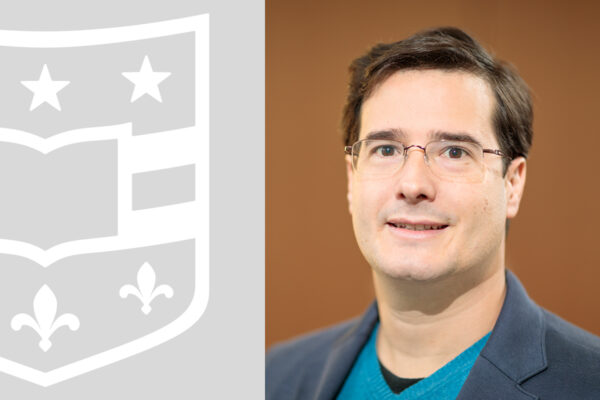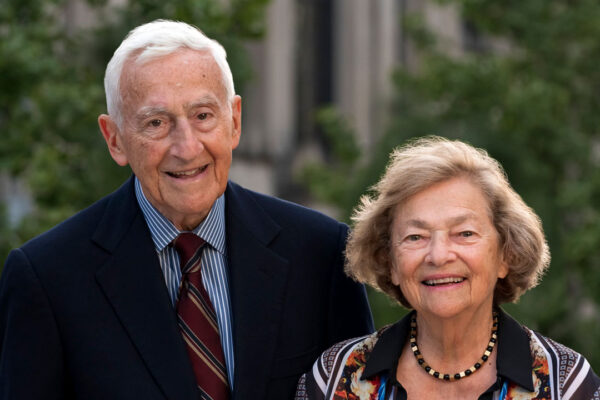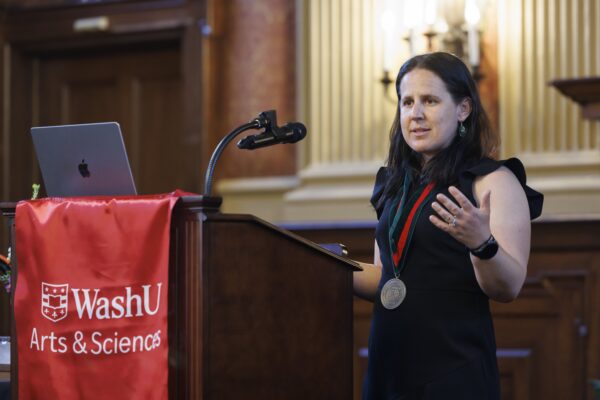Internationally renowned physician-scientist and pharmaceutical executive, P. Roy Vagelos, MD, and his wife, Diana, have pledged $15 million to bolster the Medical Scientist Training Program (MSTP) at Washington University School of Medicine in St. Louis — a pioneering program founded by Roy Vagelos more than 50 years ago to train future generations of physician-scientists.
The gift will establish an endowment to help support the education, research and training of aspiring physician-scientists enrolled in one of the nation’s largest and most prestigious MD/PhD programs.
In recognition of the couple’s generosity, WashU Medicine’s program has been named the Roy Vagelos Medical Scientist Training Program.
Vagelos, the former CEO and chairman of Merck & Co., founded WashU Medicine’s MD/PhD program in 1969, when he was head of the school’s Department of Biological Chemistry (now the Department of Biochemistry and Molecular Biophysics). He recognized the unique role physician-scientists play in advancing medicine: They bridge patient care and research to identify problems in the clinic and pursue solutions in the laboratory.
Research conducted at Merck & Co. has served as the foundation for many life-saving medications, such as targeted cancer therapies, statins to lower the risk of heart attacks and stroke, and anti-viral drugs to treat HIV, as well as pivotal advances that led to the development of vaccines against infectious diseases.
“Physician-scientists have played an important role in the rapid advances in biomedical research over many decades, and the WashU MSTP has been a world leader in training and nurturing these types of careers,” said David H. Perlmutter, MD, executive vice chancellor for medical affairs, the Spencer T. and Ann W. Olin Distinguished Professor and the George and Carol Bauer Dean of WashU Medicine. “Roy Vagelos started the program with Bill Danforth, and this newest gift will help sustain the program and WashU Medicine’s legacy of scientific innovation and excellence in training. Roy and Diana are true champions of physician-scientists.”
Physicians in the lab: A WashU legacy
For more than half a century, WashU Medicine’s MSTP has been supported by training grants from the National Institutes of Health (NIH) as well as significant institutional investments. The program combines elements of MD and PhD programs into a rigorous curriculum for MD/PhD students and is distinctive because from day one, it integrates medical and research training, and it carves out dedicated time for medical students to pursue challenging PhD research projects with faculty mentors who are leaders in their fields.
“Over the decades, WashU Medicine has been home to some of the most influential physician-scientists in the world, including in the academic, biotech and pharma sectors,” Perlmutter said.
More than 800 physician-scientists have graduated from WashU Medicine’s MSTP, with more than 80% now working in academic medicine, at the NIH or in the pharmaceutical or biotechnology sectors.
As a young physician, Vagelos spent a decade at the NIH, where he conducted research in biochemistry and started his career as a physician-scientist. He then was recruited to WashU Medicine in 1966, to succeed Carl Cori, who previously led the department and with his wife, Gerty Cori, received the Nobel Prize in physiology or medicine in 1947 for their research on sugar metabolism.
“Carl and Gerty Cori liked having clinical people in their laboratories,” Vagelos recalled. “Traditionally, they would have two to four people who had just finished their residency in medicine. They helped establish a pattern of young clinicians coming to WashU for a year or two of training in basic science and then going back into the clinical field as division chiefs in cardiology, pulmonology or oncology, for example. Having training in the Cori Lab strengthened their skill sets.”
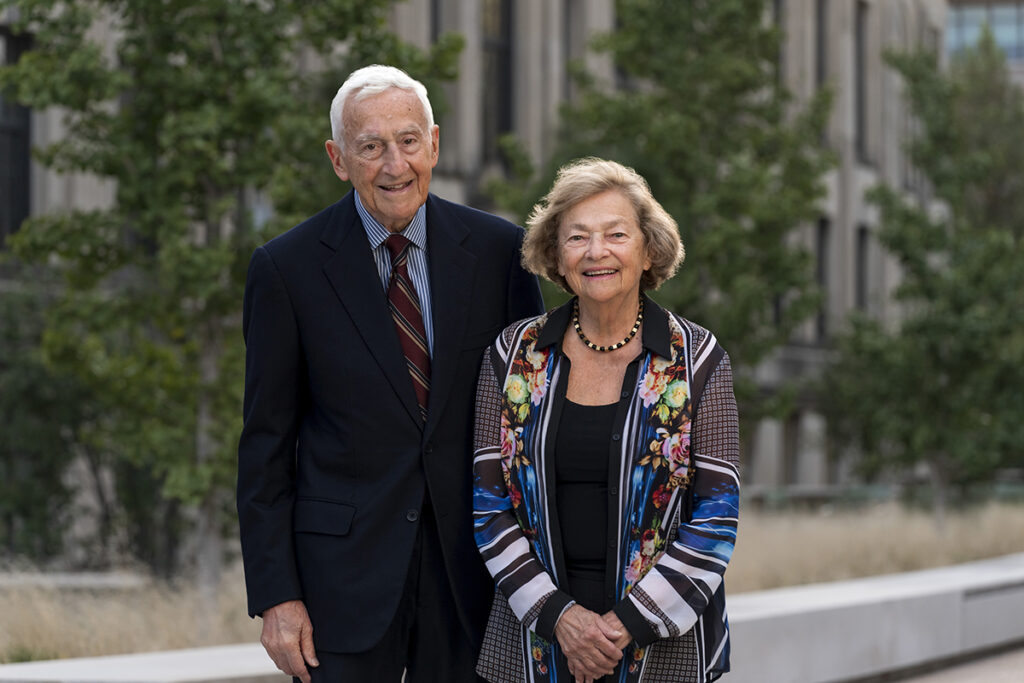
Investing in future biomedical leaders
After nearly a decade at WashU Medicine, Vagelos left the university in 1975 to join Merck & Co., where he directed the discovery of the statin drugs Mevacor and Zocor, which have been prescribed to millions to lower cholesterol and reduce the risk of cardiovascular disease. There, he ascended to CEO and chairman. He was instrumental in ensuring that ivermectin, a drug developed by Merck to treat river blindness, a parasitic disease, was made available at no cost to governments and patients as part of a successful public health campaign to reduce its incidence.
After retiring from Merck after 20 years with the company, Vagelos served as chair of the board of directors at Regeneron Pharmaceuticals for 28 years. He is a member of the National Academy of Sciences, the National Academy of Medicine, the American Academy of Arts and Sciences, and the American Philosophical Society.
Roy and Diana Vagelos are highly regarded philanthropists who have supported scholarships, fellowships, professorships, facilities, and science and medical education at major universities, including their alma maters. Roy Vagelos graduated from the University of Pennsylvania and what is now the Columbia University Vagelos College of Physicians and Surgeons. Diana Vagelos, a former overseer of the University of Pennsylvania Museum of Archaeology and Anthropology, graduated from Barnard College, where she serves as vice chair of the board of trustees.
The Vageloses have been generous supporters of WashU Medicine. In 2021, the couple gave $15 million to support WashU’s Division of Biology & Biomedical Sciences (DBBS), another pioneering training program that Roy Vagelos helped establish in 1973. The program united basic science departments from WashU Medicine with the Department of Biology in Arts & Sciences to offer unparalleled graduate training for PhD and MSTP students as well as research opportunities for undergraduates and medical students. Such collaborations elevated the caliber of the university’s life sciences curriculum while also advancing scientific discovery and innovation. The division was renamed the Roy and Diana Vagelos Division of Biology & Biomedical Sciences in their honor. Like the MSTP, the DBBS program is among the top in the nation.
Private investments in science and medicine have become essential given shifting regulations and funding uncertainties within the federal government, including the NIH, Vagelos said.
“Endowments can help safeguard disruption of important work being conducted to improve human health and save lives,” he said. “WashU Medicine’s proven record of excellence in research, education and clinical care makes it a smart investment.”
The Vageloses’ gift will support new initiatives that expand the research opportunities and training for physician-scientists at WashU Medicine. Such training can take up to eight or more years, said Wayne M. Yokoyama, MD, the program’s director and associate dean of WashU Medicine’s Division of Physician-Scientists.
“We receive wonderful applicants who have succeeded at an exceptional level as undergraduates and show great promise to be outstanding physician-scientists,” added Yokoyama, also the Sam J. Levin and Audrey Loew Levin Professor of Arthritis Research. “When reviewing applications, we look for the very best students no matter what their backgrounds or circumstances. The training they then receive through the MSTP prepares them to integrate their experiences in the clinic and lab with the aim of discovering innovative ways to diagnose and treat patients.”
Students played a large role in inspiring the Vageloses’ gift. “One of Roy’s favorite activities when visiting WashU Medicine is talking with the students,” Diana Vagelos said. “They’re so hopeful and dedicated to improving human health.”
“The students are the best; they are our future,” Roy Vagelos said.
About Washington University School of Medicine
WashU Medicine is a global leader in academic medicine, including biomedical research, patient care and educational programs with 2,900 faculty. Its National Institutes of Health (NIH) research funding portfolio is the second largest among U.S. medical schools and has grown 83% since 2016. Together with institutional investment, WashU Medicine commits well over $1 billion annually to basic and clinical research innovation and training. Its faculty practice is consistently within the top five in the country, with more than 1,900 faculty physicians practicing at 130 locations. WashU Medicine physicians exclusively staff Barnes-Jewish and St. Louis Children’s hospitals — the academic hospitals of BJC HealthCare — and treat patients at BJC’s community hospitals in our region. WashU Medicine has a storied history in MD/PhD training, recently dedicated $100 million to scholarships and curriculum renewal for its medical students, and is home to top-notch training programs in every medical subspecialty as well as physical therapy, occupational therapy, and audiology and communications sciences.
Originally published on the WashU Medicine website
